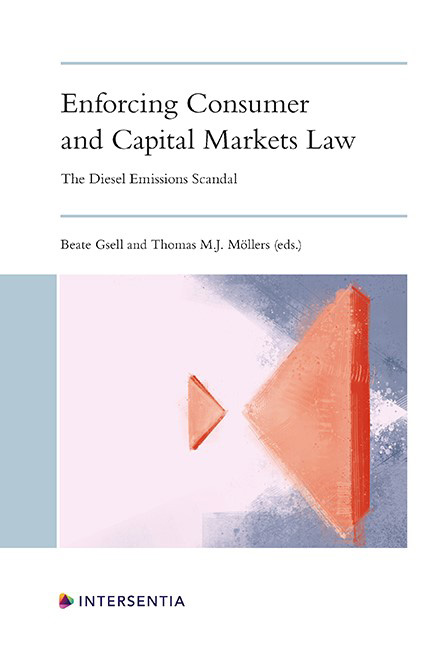Book contents
- Frontmatter
- Acknowledgement
- Contents
- List of Cases
- List of Abbreviations
- List of Contributors
- PART I INTRODUCTION
- PART II EUROPE
- PART II BEYOND EUROPE
- PART III THE SUPRANATIONAL PERSPECTIVE
- PART IV LEGAL PRACTICE PERSPECTIVE
- PART V INTRADISCIPLINARY ANALYSIS AND REFORM RECOMMENDATIONS
- Key Source Bibliography
- Index
- About the Editors
Enforcing Consumer and Capital Markets Law in France
Published online by Cambridge University Press: 22 December 2020
- Frontmatter
- Acknowledgement
- Contents
- List of Cases
- List of Abbreviations
- List of Contributors
- PART I INTRODUCTION
- PART II EUROPE
- PART II BEYOND EUROPE
- PART III THE SUPRANATIONAL PERSPECTIVE
- PART IV LEGAL PRACTICE PERSPECTIVE
- PART V INTRADISCIPLINARY ANALYSIS AND REFORM RECOMMENDATIONS
- Key Source Bibliography
- Index
- About the Editors
Summary
In France, diesel technology has been favoured for decades until very recently. The price of diesel was actually much lower than any other products. Then, for many reasons, especially to promote environmental protection, diesel began to be criticised and its price increased. The yellow vests’ demonstrations were triggered by such increases as when people living at the periphery of big towns started spending a lot of money on of their diesel cars. The Dieselgate scandal has also certainly had its part in the change of mind concerning diesel in France. The role of the French State is very important as well.
As far as consumer protection and capital market are concerned, France is mainly a centralised system of administration. The General Directorate for Competition Policy, Consumer Affairs and Fraud Control (DGCCRF) is very powerful and plays the role of a consumer police, which serves as either an administrative or a judicial police. It can initiate administrative investigations and impose administrative sanctions. In the field of capital market, the Financial Markets Regulator (AMF) has administrative powers to investigate and sanction, and even potentially bring criminal charges. Hence, the French State is modelled upon the interventionist system, not upon the German ordo-liberalist system.
Criminal proceedings are available for consumer protection and capital market litigations. However, the Public Prosecutor is not an independent body from the executive power since its head is the Minister of Justice. Judges are in principle independent, but they are dependent on the Public Prosecutor for the pace of a case.
Private enforcement is not very developed, as it is in Competition Law (a consequence of the 2014 Directive). Many procedural tools have actually been implemented but are not often used (representative action, injunction to do something, collective redress action, collective interest action, etc.) since consumer associations, the ones that are able to bring actions, are not numerous and do not have the financial and human resources to do so. There is a lack of evidence tools as well (such as cross-examination or discovery, yet to be found in antitrust private enforcement or in front of the Paris International Chambers). Evidence brought by public authorities cannot always be easily used in criminal or civil proceedings. In a way, the possibilities of private enforcement may be seen as an alibi to hide the lack of political will to condemn manufacturers.
- Type
- Chapter
- Information
- Enforcing Consumer and Capital Markets LawThe Diesel Emissions Scandal, pp. 71 - 92Publisher: IntersentiaPrint publication year: 2020

